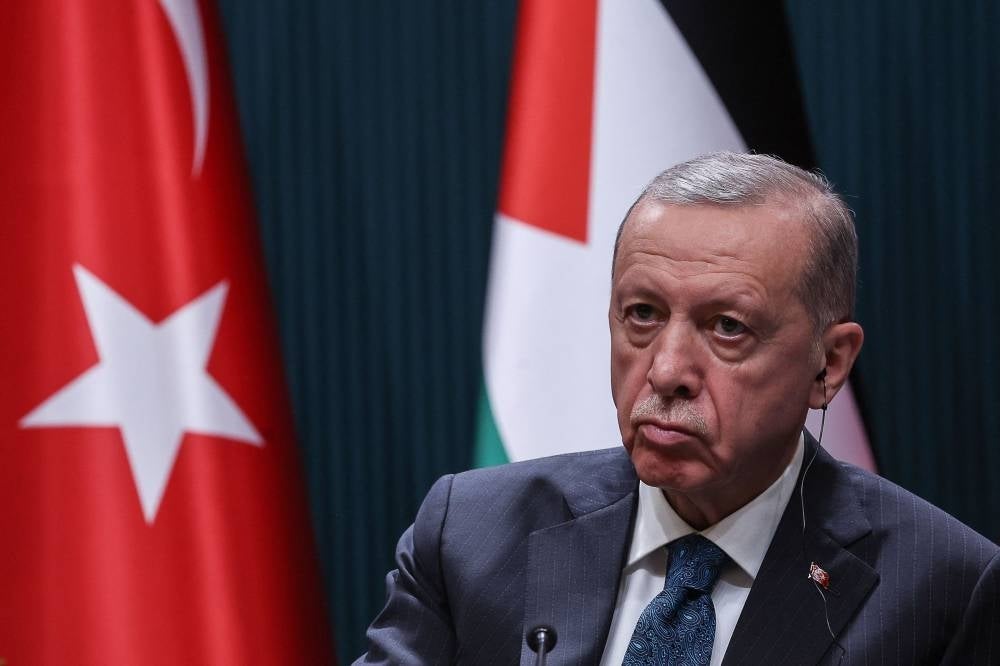Economic challenges and Turkey's enhanced policy with Israel
NAZARI ISMAIL & AHMAD HANI HARIZA
Turkish President Recep Tayyip Erdogan has arguably made his presence felt in recent years globally with his pro-Islamist stance and anti-western rhetoric.
This assertiveness came into display further when Turkish foreign policy shifted from a "zero problems with neighbours" and predominantly non-interference to an interventionist one towards the domestic affairs of other neighbouring nations.
For example, emboldened by the power vacuum and political turmoil in parts of the Middle East and Africa following the onset of the Arab Spring in 2011, Ankara did not wait. It hastened to propel its domestic agenda of Islamism outwards and extend its Neo-Ottomanism outreach to Tunisia, Libya, Egypt, and Syria.
They strengthened ties with the most influential Islamic movement in the Middle East - the Muslim Brotherhood and also got involved in Syria's conflict through the establishment of military operations there to tackle the threats posed by the Kurdish Army and the Kurdish Democratic Union Party, both of which were American-backed separatists groups operating in northeast Syria, bordering Turkey. Turkey also got involved militarily in Libya and sided with Qatar during the latter's brief spat with Saudi Arabia and the UAE.
Following the 2017 constitutional amendments, the president's office now has more powers, including on foreign affairs. The opposition and the foreign ministry are now relatively powerless.
The amendments further strengthen Erdogan's foreign approach, which is already bold and imposing as he accumulates more power in his office.
However, Turkey's domestic economic problems made Erdogan realize that he had to scale down his external policy of assertiveness. The country's economy is experiencing a severe inflation rate problem and a high cost of living. The Turkish lira's value has also plunged relative to the Dollar.
Turkey desperately needs foreign investment. However, in recent years, its political and economic situations have frightened foreign investors, resulting in a capital outflow that subsequently prompted the cancellation of several investment projects, including the F-35 fthe United States.ighter jet program by
Meanwhile, countries in the region that are direct or indirect competitors to Turkey in terms of regional influence have been forming coalitions and agreements to advance their diplomatic ties.
These include the trilateral energy agreement between Greece – the Republic of Cyprus – Israel; the trilateral joint defence agreement between Greece – the Republic of Cyprus – Egypt; the East Mediterranean Gas Forum and EastMed pipeline planning; and the Abraham Accord. Some of these have deliberately excluded Turkey.
Moreover, with the pressure of the 2023 presidential election, which Erdogan narrowly won, he was forced to shift his foreign policies hoping they would positively influence Turkey's economy.
In other words, Erdogan has little choice. He was pushed into a corner by economic circumstances. He then decided to initiate a 180-degree decision to his foreign policies and pursue regional rapprochement aimed at reconciliation ties with former adversary countries, including Israel, to regain trust and direct investment into Turkey's economy.
Despite the frozen relationship and the previous expulsion of the Israeli ambassador as a result of the massacres conducted by the Israeli military in Gaza - the economic crisis and geopolitical deadlock - as mentioned earlier, became the basis behind the resumption of diplomatic ties between Turkey and Israel, as both deemed their increasing mutual trust to be inevitable.
For example, Turkey and the Gulf states have restored their diplomatic and trade relationship.
They have announced business agreements valued worth billions of dollars, which include the privatization of Turkish state assets, promises of direct investments totalling more than $30 billion, defence industry transactions, and business acquisitions or contracts.
The same situation is also happening between Turkey and Israel; following Israeli President Herzog's visit to Ankara last year, trade between the two has increased tremendously, with exports to Israel rising over 11% to $7 billion last year. Tourism also reached a high point during the first nine months after the visit, leading to the revival of cruise lines and a surge in Israeli companies booking direct flights to popular Turkish resorts like Antalya and Bodrum.
The conjoint agreements were economically beneficial for both Turkey and Israel. Israel's improved relations with Turkey brought new life into the seemingly stagnant Abraham Accord between Israel, the United Arab Emirates, Bahrain, and Morocco. Another indirect benefit is Turkey's alliance with Azerbaijan because it means that they, too, gain the upper hand in further curbing Tehran's expanding regional influence.
The invasion of Russia in Ukraine also marks a noteworthy geopolitical shift, as European country starts to seek alternatives in acquiring energy security, meaning there is a chance for Turkey to overcome the regional isolation situation by becoming a signatory member for the Eastern Mediterranean gas pipeline project, allowing a substantial amount of natural gas from Israel to reach Europe through Turkey. An additional economic benefit for Turkey from this project is that Turkey can further expand its hydrocarbon activities and natural gas drilling and bypass the restrictions imposed by the European Union, namely the western areas of the Republic of Cyprus marked by the Exclusive Economic Zone set under international law. However, Israel has promised Greece and the Republic of Cyprus that this Turkey-Israel cooperation will not disrupt any previous agreements, including the defence ties between them and the United States.
In conclusion. Turkey's latest foreign policy decisions are primarily due to its attempt to solve its economic problems, which are themselves due to ill-informed decisions by Erdogan and increased dependence on a debt-based monetary system.
Erdogan's efforts in previous years to chart an `Islamic' path for the country independent of Western hegemony and transform Turkey into an influential nation in the Islamic world are admirable.
Unfortunately, Turkey's embeddedness in the usury and debt-based economic system meant it was not impervious to financial and economic pressure, causing it to back-paddle its policies.
The saddest outcome is that Turkey has also downgraded its previous stance of supporting the cause of justice and freedom in Palestine. Instead, it is now enhancing its relations with the Israeli apartheid regime, despite the latter's increased abuse of Palestinians' human rights.
Nazari Ismail and Ahmad Hani Hariza are from Universiti Malaya’s Hashim Sani Centre for Palestinian Studies, the first academic centre in the country and region which is devoted to academic activities in the field of Palestine studies
The views expressed in this article are the authors' own and do not necessarily reflect those of Sinar Daily.
Download Sinar Daily application.Click Here!














